A Struggle for Survival in a Changing Ecosystem
Majestic and powerful, lions are more than just symbols of strength—they are vital players in maintaining the balance of Africa's ecosystems. Yet, these iconic predators are in trouble. Over the past few decades, wild lion populations have plummeted due to habitat loss, human-wildlife conflict, illegal poaching, and the devastating impact of infectious diseases. Now listed as Vulnerable by the International Union for Conservation of Nature (IUCN), African lions face an increasing threat from diseases introduced into their shrinking habitats, putting them at risk of local extinction. This loss could trigger a cascade of ecological imbalance, affecting entire ecosystems. South Africa, home to the second-largest population of free-ranging lions, primarily in Kruger National Park and Hluhluwe-iMfolozi Park, faces a unique challenge: these regions are hotspots for animal tuberculosis (TB) caused by Mycobacterium bovis, a pathogen that infects over 23 wildlife species, including lions.
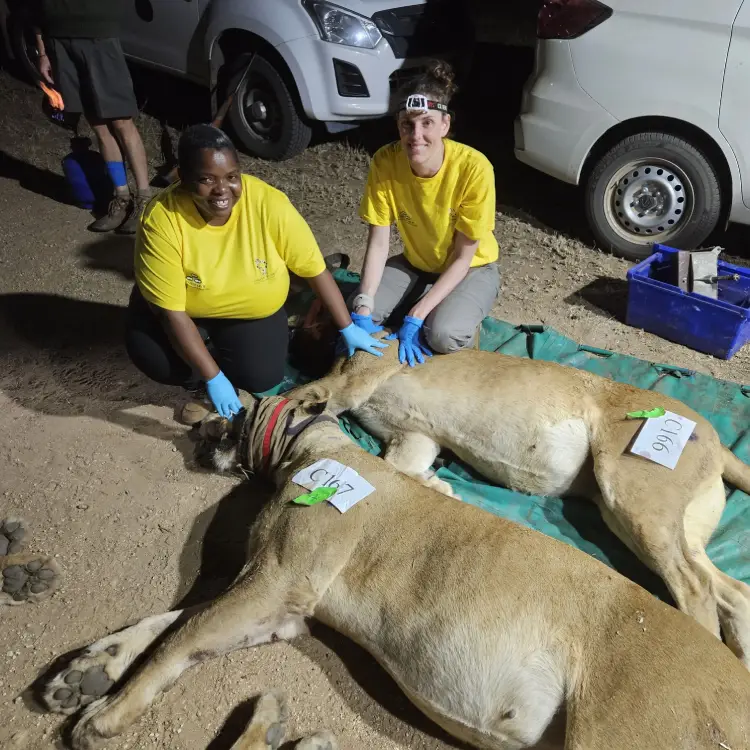
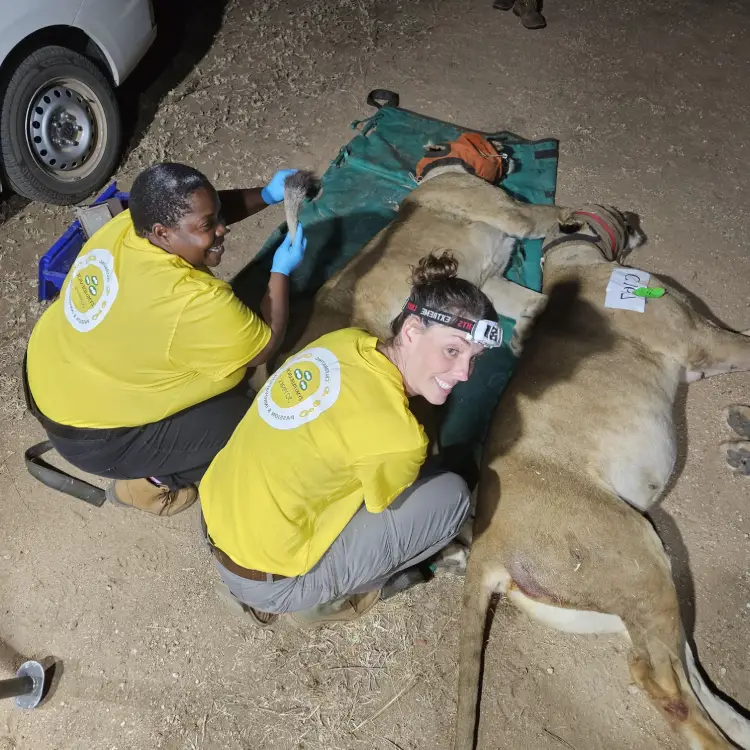
Figure 1. Dr. Rachiel Gumbo (Postdoctoral Researcher, left) and Dr. Tanya Kerr (Research Study Coordinator, right) monitoring immobilized African lions during field study in Kruger National Park, South Africa, 2024.
The Threat of Tuberculosis to African Wildlife and Ecosystems
TB in animals has important implications for domestic and wild animals, as well as humans. Along with affecting animal health and livestock production, there are broad impacts on food security, livelihoods of rural African communities who rely on livestock, ecotourism, and wildlife conservation of Africa’s unique biodiversity. The Stellenbosch University (SU) Animal TB research group, under the leadership of Professor Michele Miller, National Research Foundation (NRF) South African Research Chairs Initiative (SARChI) in Animal TB, is the only research group in South Africa that focuses solely on investigating animal TB, primarily in South African wildlife species. The SU Animal TB Research Group is based in the Division of Molecular Biology and Human Genetics (MBHG), at the Faculty of Medicine and Health Sciences (FMHS) in Cape Town, South Africa. The translational research program focuses on improving understanding animal health and the role of TB in Africa’s vulnerable wildlife species.
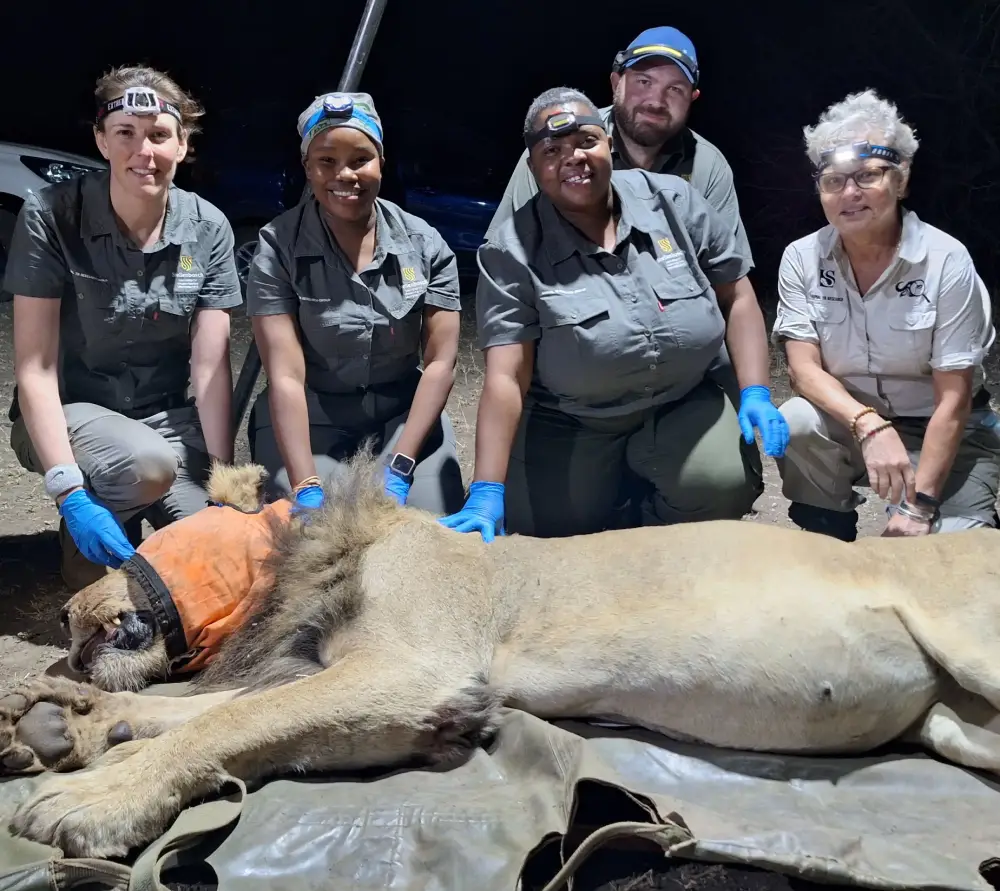
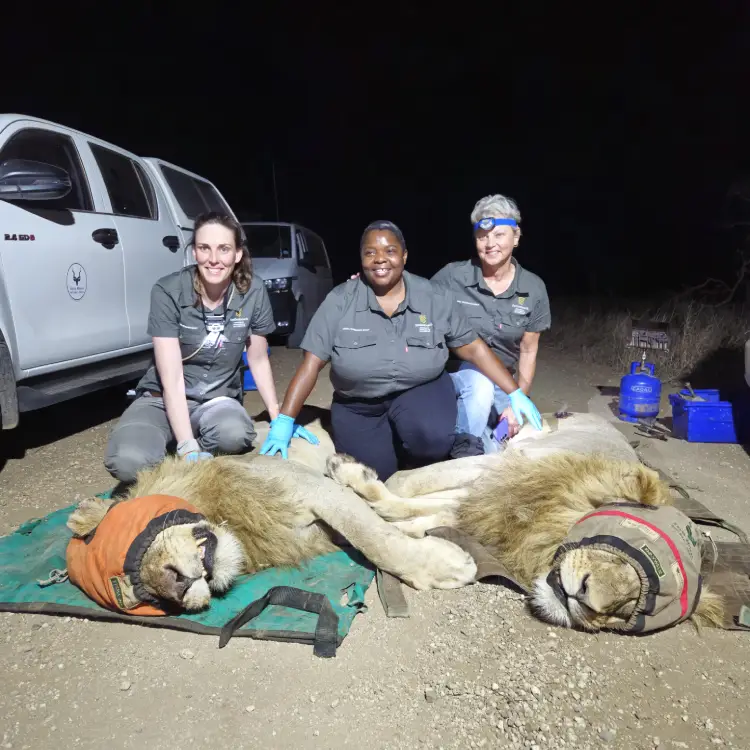
Figure 2. Members of the SU Animal TB research group during 2024 field work in Kruger National Park, South Africa. Left panel: From left to right, Dr. Tanya Kerr (Research Study Coordinator), Intimate Shongwe (Research Intern), Dr. Rachiel Gumbo (Postdoctoral Researcher), Prof. Michele Miller (Veterinarian and NRF SARChI) and Prof. Wynand Goosen (Researcher).
Understanding Key Knowledge Gaps
The long-term impact of TB on infected African lion populations is largely unknown, although individuals can develop chronic progressive disease, and even die. Resources for studying diseases in African wildlife are limited, despite TB being a controlled disease in South Africa that can impede wildlife translocation and other conservation efforts. A comprehensive understanding of infection and disease is crucial for detecting and preventing TB. Therefore, our research addresses key knowledge gaps regarding TB in African lions.
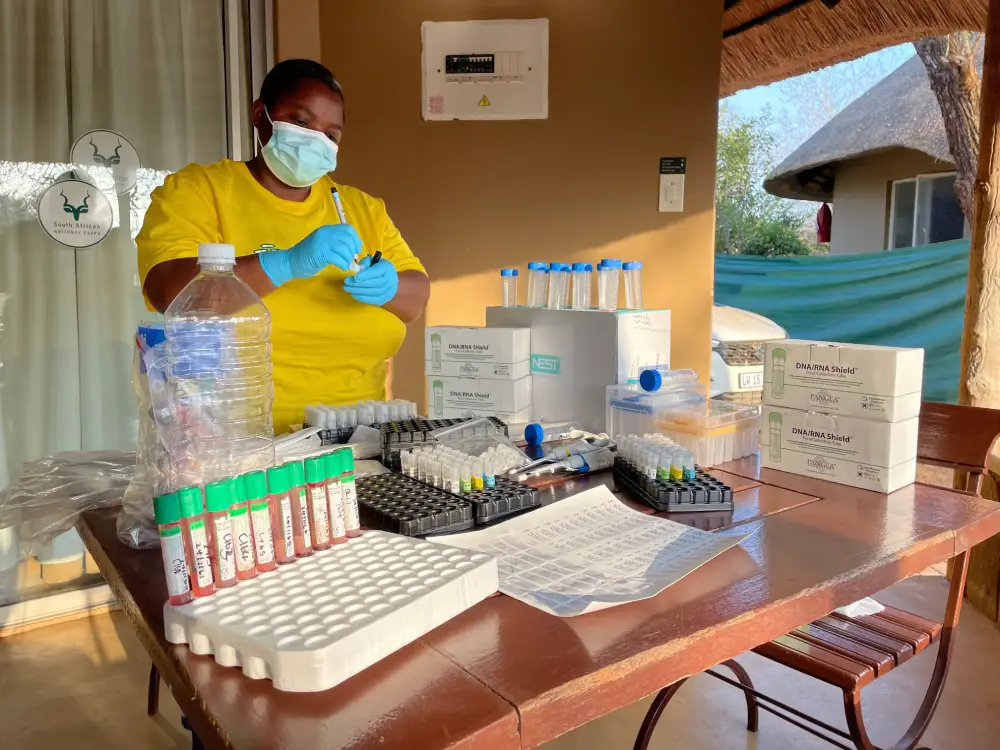
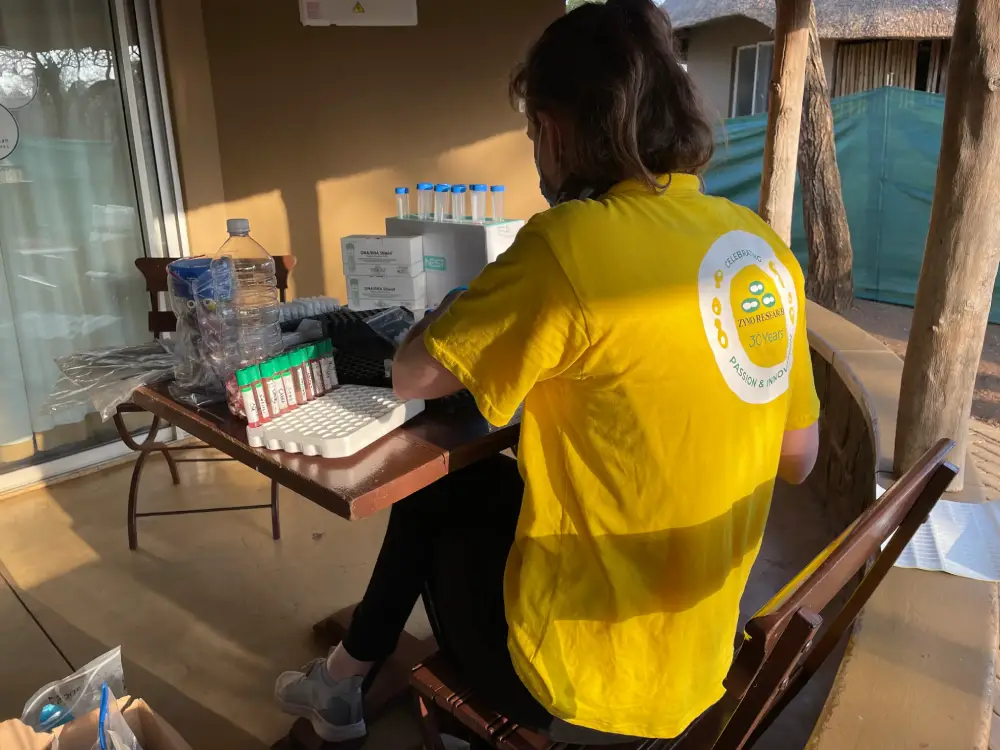
Figure 3. Dr. Rachiel Gumbo (Postdoctoral Researcher, left panel) and Dr. Tanya Kerr (Research Study Coordinator, right panel) process lion samples in a temporary field laboratory in Kruger National Park, South Africa.
Advancing Conservation Efforts: The Role of Microbiome Research in Lion Health
The gut microbiome (microbes found living in the gut) plays a significant role in health and immune responses. Our current research aims to characterize the microbiome and immunological responses in uninfected and naturally M. bovis-infected lions. The microbiological population in feces may change due to infection or environmental changes, potentially influencing susceptibility to other diseases, such as TB. Hence, understanding the microbiome of these majestic animals can offer valuable insights into their health and conservation needs.
Feces are a simple and cost-effective sample to monitor lion health. During the 2024 field study, fecal samples were collected using Zymo Research’s DNA/RNA Shield™ Fecal Collection Tubes from immobilized lions in the Kruger National Park. The reagents in these tubes help preserve the integrity of the genetic material in the feces, inactivate any infectious agents, and allow for storage at ambient temperatures. These features are essential for field work when laboratory access and refrigeration are unavailable.
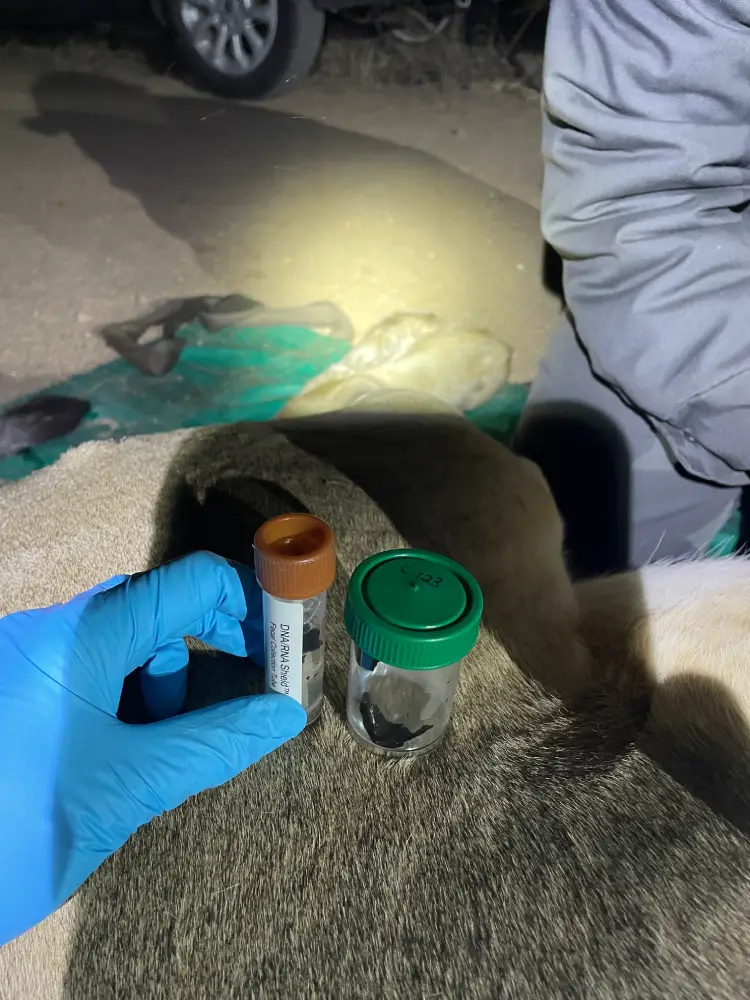
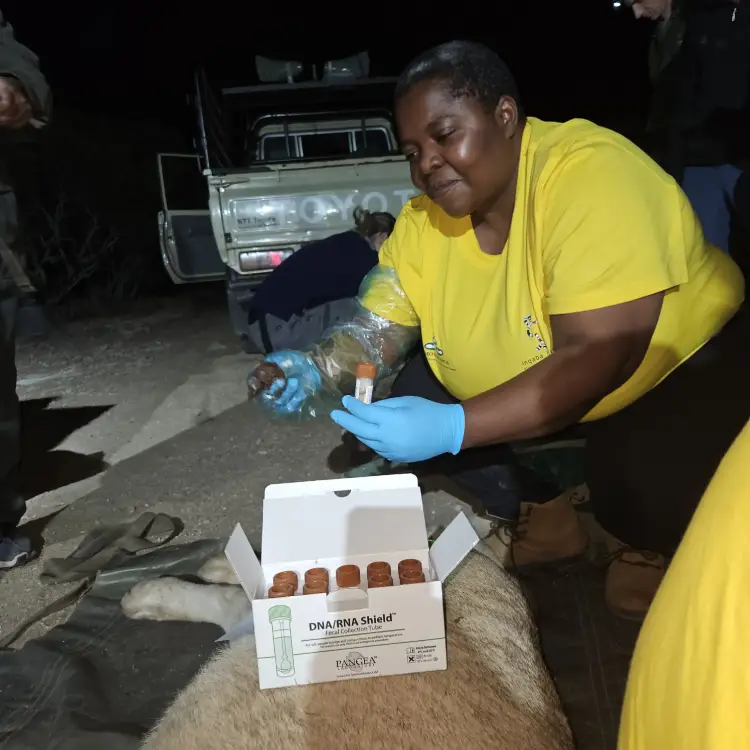
Figure 4. Dr. Rachiel Gumbo (Postdoctoral Researcher) using Zymo Research’s DNA/RNA Shield™ Fecal Collection Tube to collect fecal samples from African lions during 2024 field work in Kruger National Park, South Africa.
The integration of Zymo Research’s DNA/RNA Shield™ Fecal Collection Tubes into our lion microbiome study marks an important step forward in wildlife research. By preserving genetic material effectively in the field, we gain deeper insights into the health and disease dynamics of African lions. This enhanced understanding contributes directly to conservation efforts aimed at mitigating the risks of TB and other infectious diseases. Ultimately, safeguarding lion populations not only helps maintain ecological balance but also protects the biodiversity and economic value tied to Africa’s unique natural heritage, ensuring a future where these majestic predators can continue to thrive.
